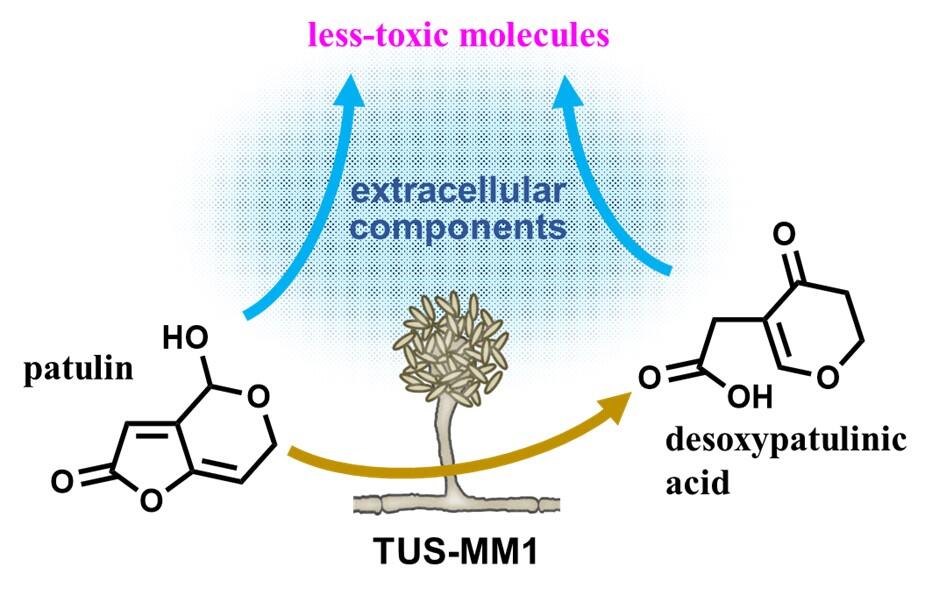2023.08.31 Thursday
Newly Discovered Fungus Helps Destroy a Harmful Food Toxin
Scientists identify a fungal strain that transforms patulin, a dangerous mycotoxin sometimes found in fruits, into less toxic byproducts

Patulin (C7H6O4), a mycotoxin produced by several types of fungi, is toxic to a variety of life forms, including humans, mammals, plants, and microorganisms. In particular, environments lacking proper hygienic measures during food production are susceptible to patulin contamination as many of these fungi species tend to grow on damaged or decaying fruits, specifically apples, and even contaminate apple products, such as apple sauce, apple juice, jams, and ciders.
Responsible for a wide variety of health hazards, including nausea, lung congestion, ulcers, intestinal hemorrhages, and even more serious outcomes, such as DNA damage, immunosuppression, and increased cancer risk, patulin toxicity is a serious concern worldwide. As a result, many countries have imposed restrictions on the permitted levels of patulin in food products, especially baby foods as infants are more vulnerable to the effects of patulin.
Treatment of patulin toxicity include oxygen therapy, immunotherapy, detoxification therapy, and nutrient therapy. However, as prevention is often better than cure, scientists have been on the lookout for efficient ways to mitigate patulin toxicity in food products. To this end, a research team including Associate Professor Toshiki Furuya from Tokyo University of Science (TUS) in Japan, recently screened for soil microorganisms that can potentially help keep patulin toxicity in check. Their study, published online in Volume 12, Issue 4 of MicrobiologyOpen on 11 August 2023, was co-authored by Ms. Megumi Mita, Ms. Rina Sato, and Ms. Miho Kakinuma, all from TUS.
The team cultured microorganisms from 510 soil samples in a patulin-rich environment, looking for those that would thrive in presence of the toxin. Next, in a second screening experiment, they used high-performance liquid chromatography (HPLC) to determine the survivors that were most effective in degrading patulin into other less harmful chemical substances. Accordingly, they identified a filamentous fungal (mold) strain, Acremonium sp. or "TUS-MM1," belonging to the genera Acremonium, that fit the bill.
The team then performed various experiments to shed light on the mechanisms by which TUS-MM1 degraded patulin. This involved incubating the mold strain in a patulin-rich solution and focusing on the substances that gradually appeared both inside and outside its cells in response to patulin over time.
One important finding was that TUS-MM1 cells transformed any absorbed patulin into desoxypatulinic acid, a compound much less toxic than patulin, by adding hydrogen atoms to it. "When we started this research, only one other filamentous fungal strain had been reported to degrade patulin," comments Dr. Furuya. "However, prior to the present study, no degradation products had ever been identified. In this regard, to our knowledge, TUS-MM1 is the first filamentous fungus shown to be capable of degrading patulin into desoxypatulinic acid."
Moreover, the team found that some of the compounds secreted by TUS-MM1 cells can also transform patulin into other molecules. By mixing patulin with the extracellular secretions of TUS-MM1 cells and using HPLC, they observed various degradation products generated from patulin. Encouragingly, experiments on E. coli bacterium cells revealed that these products are significantly less toxic than patulin itself. Through further chemical analyses, the team showed that the main agent responsible for patulin transformation outside the cells was a thermally stable but highly reactive compound with a low molecular weight.
Overall, the findings of this study take us a step closer toward efficient solutions for controlling the levels of patulin in food. Dr. Furuya speculates: "Elucidating the pathways via which microorganisms can degrade patulin would be helpful not only for increasing our understanding of the underlying mechanisms in nature but also for facilitating the application of these organisms in biocontrol efforts."
Let us hope that these efforts will pave the way for safer fruit-based foods and beverages!

Image Title: The mold TUS-MM1 can degrade the patulin mycotoxin.
Image Caption: Patulin toxicity is a serious food safety hazard, and scientists are looking for ways to control it. Now, researchers from TUS, Japan, have identified, for the first time, a mold strain that can convert patulin into desoxypatulinic acid and other less toxic substances, with potential applications for patulin biocontrol.
Image Credit: The Authors. MicrobiologyOpen published by John Wiley & Sons Ltd.
Image Source Link: https://onlinelibrary.wiley.com/doi/10.1002/mbo3.1373
License Type: CC BY 4.0
Reference
| Title of original paper | : | Isolation and characterization of filamentous fungi capable of degrading the mycotoxin patulin |
| Journal | : | MicrobiologyOpen |
| DOI | : | 10.1002/mbo3.1373 |
About The Tokyo University of Science
Tokyo University of Science (TUS) is a well-known and respected university, and the largest science-specialized private research university in Japan, with four campuses in central Tokyo and its suburbs and in Hokkaido. Established in 1881, the university has continually contributed to Japan's development in science through inculcating the love for science in researchers, technicians, and educators.
With a mission of "Creating science and technology for the harmonious development of nature, human beings, and society," TUS has undertaken a wide range of research from basic to applied science. TUS has embraced a multidisciplinary approach to research and undertaken intensive study in some of today's most vital fields. TUS is a meritocracy where the best in science is recognized and nurtured. It is the only private university in Japan that has produced a Nobel Prize winner and the only private university in Asia to produce Nobel Prize winners within the natural sciences field.
■
Tokyo University of Science(About TUS)

About Associate Professor Toshiki Furuya
from Tokyo University of Science
Dr. Toshiki Furuya is an Associate Professor at the Faculty of Science and Technology of the Department of Applied Biological Science at TUS. He completed his graduation and post-graduation from Waseda University in Tokyo, Japan. He has won many awards, including the 24th Excellent Paper Award by Society of Biotechnology in 2016. His areas of research include applied biochemistry, microbial metabolism, enzyme catalysis, bioproduction, and bioremediation.
Official TUS website 
Funding information
There is no funding to declare.

